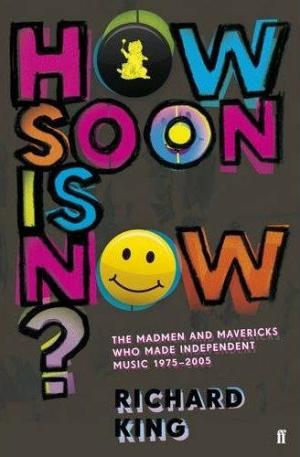On reading this one is reminded of the essential vanity of the music business, its inability to balance hope and reality, the way that the alien nature of how money works clashes with the utopianism that doing things on impulse (such as releasing challenging records) releases.
On reading this one is reminded of the essential vanity of the music business, its inability to balance hope and reality, the way that the alien nature of how money works clashes with the utopianism that doing things on impulse (such as releasing challenging records) releases.

(Richard King – Faber and Faber)
Another book based around the British punk and post punk era? Well, yes, but this does have a number of things to recommend it. For one, Richard King’s How Soon Is Now? is a good and meaty read; well written and engaging enough as an introduction to the subject, should you have dropped in from Mars and never heard of Joy Division and co. And because of the author’s obvious knowledge and experience of his subject it’s also very clear; unencumbered by any bluster or annoying loose ends. At times it bowls along at some speed, (you are struck by the compactness of the narrative, especially the chapters dealing with the rumbustious Alan McGee), but luckily King handles the various narrative strands with aplomb. Still, you do wonder how much more this subject has got to give. You get the feeling whether the whole subject would be better served if it was bound up and trundled off to a seat of academic learning to be pored over by middle aged blokes like myself, swapping learned bon mots over the dealings of Cally Calomon or Jayne Casey.
It’s a dilemma that King battles with pretty well: after all we are talking here about the scene shifters, the impresarios, the blokes who work round the actual attraction. And to delve deep on this topic could mean that you either lose sight of the main subject (which on the whole this book doesn’t) or come close to being a sort of obsessive insider’s manual: which, I suppose is a criticism that can be levelled at it, however enjoyable a read it is. When we start to document these subterranean characters (brilliant and enlightening though people like Nick Currie and Mick Houghton are), alongside the professional trouble makers such as McGee and Drummond or the true mainstays of the whole independent record movement, (Geoff Travis, Daniel Miller and Watts-Russell and Anthony H), you do start to wonder which other house-bound oddballs are reading this book. And if this is aimed at the skullcap private library reading crowd, it could have been twice as long and much more obsessively written…
Luckily King adds some pithy descriptions of the music, which is, at the end of it all, the one thing that really matters. He dismisses any pretentions Everett True may have had to the efficacy of his musical legacy in a brief sentence and he has a shrewd and solid sense of what is good and bad: rightly putting the boot into early Creation and C86, it was crap and undercooked – there are subjects that no amount of revisionism should alter – and clearly highlighting the bullshit and cynicism (and the true sonic dreamer’s feelings of apathy) over the whole nonsense of Britpop. This gives a feeling that on other matters his narrative can be trusted. How Soon is Now? could be a classic starter’s manual of what to avoid when embarking in the “bizz”: witness Seynmour Stein’s gameplan on Madonna unravelling and of course the many foibles of Factory Records – in this regard the chapters on Blast First and Sonic Youth are tremendous and a salutary lesson of what happens to virtually everyone who dabbles in this business for the love of the music alone.
On reading this one is reminded of the essential vanity of the music business, its inability to balance hope and reality, the way that the alien nature of how money works clashes with the utopianism that doing things on impulse (such as releasing challenging records) releases. As Copey once sang: My splendid art / my sad profession, it still rings true.
Look on my works, ye Mighty, and despair! An enjoyable and entertaining book, for obsessives and amateur sleuths everywhere.
